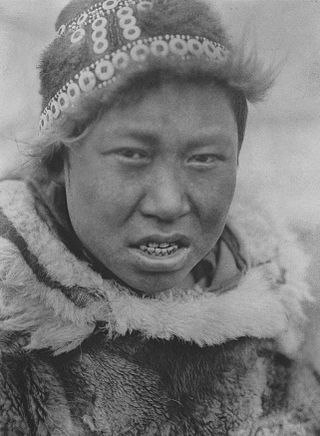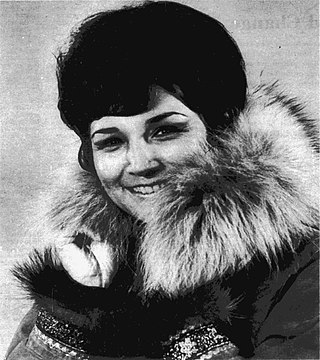
The Yupik are a group of Indigenous or Aboriginal peoples of western, southwestern, and southcentral Alaska and the Russian Far East. They are related to the Inuit and Iñupiat. Yupik peoples include the following:

The University of Alaska System is a system of public universities in the U.S. state of Alaska. It was created in 1917 and comprises three separately accredited universities on 19 campuses. The system serves nearly 30,000 full- and part-time students and offers 400 unique degree programs.

The University of Alaska Fairbanks is a public land-, sea-, and space-grant research university in College, Alaska, a suburb of Fairbanks. It is the flagship campus of the University of Alaska system. UAF was established in 1917 and opened for classes in 1922. Originally named the Alaska Agricultural College and School of Mines, it became the University of Alaska in 1935. Fairbanks-based programs became the University of Alaska Fairbanks in 1975.
Ann Fienup-Riordan is an American cultural anthropologist known for her work with the Yup'ik of western Alaska, particularly on Nelson Island and the Yukon–Kuskokwim Delta. She lives in Anchorage, Alaska. She received Historian of the Year awards from the Alaska Historical Society in 1991 and 2001.

The Yupʼik or Yupiaq and Yupiit or Yupiat (pl), also Central Alaskan Yupʼik, Central Yupʼik, Alaskan Yupʼik, are an Indigenous people of western and southwestern Alaska ranging from southern Norton Sound southwards along the coast of the Bering Sea on the Yukon-Kuskokwim Delta and along the northern coast of Bristol Bay as far east as Nushagak Bay and the northern Alaska Peninsula at Naknek River and Egegik Bay. They are also known as Cupʼik by the Chevak Cupʼik dialect-speaking people of Chevak and Cupʼig for the Nunivak Cupʼig dialect-speaking people of Nunivak Island.

Mary Sattler Peltola is an American politician and former tribal judge serving as the U.S. representative from Alaska's at-large congressional district since September 2022. A member of the Democratic Party, she previously served as a judge on the Orutsararmiut Native Council's tribal court, executive director of the Kuskokwim River Inter-Tribal Fish Commission, Bethel city councilor, and member of the Alaska House of Representatives.
Dorothy Awes Haaland was an American lawyer and politician. She served in the final Alaska Territorial Legislature when Alaska was still the Territory of Alaska. In 2009, she was added to the Alaska Women's Hall of Fame. She was the first woman to be admitted to the Alaska Bar Association.

Dove Kull (1897-1991) was a social worker from Oklahoma. After a 37-year career in Oklahoma, serving as second-in-command of the Works Progress Administration and later designing the Oklahoma Department of Public Welfare's adoption policies, Kull moved to Alaska and became the first social worker to administer service to Native Alaskans in the Aleutian Islands. She also secured the funds for the first child care center in Alaska and directed the first home-health service for the elderly in the State. She was posthumously inducted into the Alaska Women's Hall of Fame in 2015.
Marie (Nick) Arnaq Meade is a Yup'ik professor in the humanities and also a Yup'ik tradition bearer. Meade's Yup'ik name is Arnaq which means "woman." She also works and travels with the International Council of Thirteen Indigenous Grandmothers. Meade is also part of the Nunamta Yup'ik Dance Group. Meade has been documenting the cultural knowledge of Yup'ik elders, including the values, language and beliefs of the Yup'ik people for over twenty years. She is currently an instructor at the University of Alaska Anchorage.
Elaine Elizabeth Abraham was a Yakutat Tlingit Tribe elder and registered nurse who contributed to improving health care delivery in rural Alaska. Later active professionally in the field of education, she assisted with the creation of the Alaska Native Language Center, and, as a statewide administrator at the University of Alaska, in 1976, led the establishment of community colleges in underserved parts of the state.

Alice E. Brown was a member of the Kenaitze Tribe of Dena'ina peoples, who worked for Native Alaskan rights. She was involved in defending the rights of Alaska Natives and disenfranchised groups in Alaska. She was the only woman to serve on the original Alaska Federation of Natives' Board of Directors and pressed for passage of the Alaska Native Claims Settlement Act. Brown was posthumously inducted into the Alaska Women's Hall of Fame in 2010.

Mary Jane Fate was a Koyukon Athabascan activist. She was a founding member of the Fairbanks Native Association and the Institute of Alaska Native Arts and worked as a lobbyist for the Alaska Native Claims Settlement Act. She co-founded the Tundra Times newspaper and served as a director of the corporate board for Alaska Airlines for over two decades. She served as co-chair of the Alaska Federation of Natives between 1988 and 1989, the first woman to serve in the capacity, and was the third president and a founding member of the North American Indian Women's Association. Fate has served on various commissions and national studies of issues which affect indigenous people. She was the project manager of a study of women and disability, served as the only indigenous member of the U.S. Arctic Research Commission and was a member of U.S. Census Advisory Committee on indigenous populations. She has received numerous honors and awards for her activism on behalf of Native Americans and was inducted into the Alaska Women's Hall of Fame in 2014.
Beverly Patkotak Grinage is an American academic administrator and community organizer. She was president of Iḷisaġvik College from 2005 to 2010. Grinage is a former executive director of the Alaska Eskimo Whaling Commission and she was a public information officer for the North Slope Borough School District. Grinage has worked as campaign manager and previously was the owner of a publishing business. She was the managing editor of the Tundra Times and a member of the Alaska State Council on the Arts.
Irene Reed, was an American anthropologist, linguist and educator, central in preserving and promoting the Yup'ik language in Alaska.
Jane Ruth Angvik is a politician and community organizer in Alaska. She served on the Anchorage Charter Commission and the Anchorage Assembly. Angvik was the Director of Lands in the Alaska Department of Natural Resources and Commissioner of the Alaska Department of Commerce and Economic Development. She is a member of the Alaska Women's Hall of Fame.

Hannah Paul Solomon was an American community leader and artist. She was the first female mayor of Fort Yukon, Alaska, helped organize the Fairbanks Native Association, and was inducted into the Alaska Women's Hall of Fame in 2012. Her traditional beadwork is in the collections of several museums.
Vera Kingeekuk Metcalf is an educator and advocate known for her work in the preservation of the traditions and language of Alaska Native people. In 2019, she was inducted into the Alaska Women's Hall of Fame.

Laura Mae Bergt was an Iñupiaq athlete, model, politician, and activist for the Iñupiat and other Indigenous Alaskans. Born in the Northwest Arctic Borough of Alaska to bi-racial parents, she grew up in Nome and Kotzebue before attending high school in Sitka. Involved in the Native Olympic movement, she was both a nine-times winner of the Arctic Circle blanket toss event and served as chair of the World Eskimo Indian Olympics in 1966. She worked as a promoter for the new state of Alaska attending trade shows and making marketing appearances as a spokeswoman and guest on radio and television programs. From the 1960s, she worked in various policy positions at the tribal, local, state, and national level to address issues like disability, education, employment opportunities, housing, and poverty, and promoting the rights of Indigenous people.










